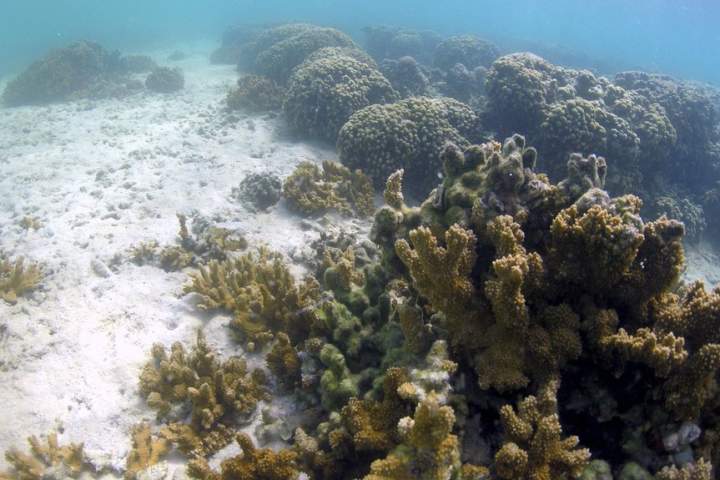Science
Coral Reefs Face Irreversible Decline, Scientists Warn Ahead of COP30

Global warming is reaching critical levels sooner than anticipated, with scientists reporting that the world’s coral reefs are nearing an almost irreversible decline. This alarming assessment was made in the Global Tipping Points report, which involved the collaboration of 160 researchers worldwide. The document identifies key thresholds in climate-driven ecosystem collapse, marking what the scientists describe as the first major tipping point. This warning comes just weeks before the COP30 climate summit, set to take place near the Amazon rainforest in Brazil.
The report indicates that the Amazon rainforest itself is now at risk of collapse if the average global temperature rises beyond 1.5 degrees Celsius. This threshold has been revised down from previous estimates, primarily due to ongoing deforestation. Additionally, the report highlights the potential disruption of the Atlantic Meridional Overturning Circulation (AMOC), a significant ocean current that contributes to milder winters in northern Europe.
Urgent Call for Action
Tim Lenton, an environmental scientist at the University of Exeter and the report’s lead author, emphasized the rapid pace of these changes. “Change is happening fast now, tragically, in parts of the climate, the biosphere,” he stated. Lenton also acknowledged some positive developments, particularly in the energy sector. Data from the nonprofit think tank Ember revealed that renewables generated more electricity than coal for the first time this year.
Despite the grim circumstances, Lenton urged nations participating in COP30 to take decisive action to reduce climate-warming carbon emissions. He stressed the importance of maintaining agency in the face of these challenges, stating, “Nobody wants to be just traumatized and disempowered. We still have some agency.”
The urgency of the situation is underscored by the fact that average global temperatures have already increased by 1.3-1.4 degrees Celsius compared to preindustrial averages, according to data from United Nations and European Union scientific agencies. The last two years have recorded the highest global temperatures on record, leading to marine heatwaves that have affected approximately 84 percent of the world’s coral reefs, resulting in widespread bleaching and mortality.
Long-Term Implications for Marine Life
Coral reefs are critical to marine ecosystems, supporting about a quarter of all marine life. For these ecosystems to recover, the world must significantly enhance climate action to reverse temperatures to just 1 degree Celsius above preindustrial levels. “The new report makes clear that each year, there is an increase in the scope and magnitude of the negative impacts of climate change,” warned Pep Canadell, a senior scientist at the CSIRO Climate Science Centre in Australia.
Currently, the world is on track for a concerning increase of approximately 3.1 degrees Celsius in warming this century, based on existing national policies. The findings from the Global Tipping Points report serve as a stark reminder of the urgent need for comprehensive climate policies and international cooperation to mitigate the impending challenges posed by climate change. As the global community prepares for COP30, the focus will likely shift to actionable strategies aimed at protecting vital ecosystems and ensuring a sustainable future.
-

 Science3 months ago
Science3 months agoToyoake City Proposes Daily Two-Hour Smartphone Use Limit
-

 Health4 months ago
Health4 months agoB.C. Review Reveals Urgent Need for Rare-Disease Drug Reforms
-

 Top Stories4 months ago
Top Stories4 months agoPedestrian Fatally Injured in Esquimalt Collision on August 14
-

 Technology3 months ago
Technology3 months agoDark Adventure Game “Bye Sweet Carole” Set for October Release
-

 World3 months ago
World3 months agoJimmy Lai’s Defense Challenges Charges Under National Security Law
-

 Lifestyle4 months ago
Lifestyle4 months agoVictoria’s Pop-Up Shop Shines Light on B.C.’s Wolf Cull
-

 Technology3 months ago
Technology3 months agoKonami Revives Iconic Metal Gear Solid Delta Ahead of Release
-

 Technology3 months ago
Technology3 months agoApple Expands Self-Service Repair Program to Canada
-

 Technology3 months ago
Technology3 months agoSnapmaker U1 Color 3D Printer Redefines Speed and Sustainability
-

 Technology3 months ago
Technology3 months agoAION Folding Knife: Redefining EDC Design with Premium Materials
-

 Technology4 months ago
Technology4 months agoSolve Today’s Wordle Challenge: Hints and Answer for August 19
-

 Business4 months ago
Business4 months agoGordon Murray Automotive Unveils S1 LM and Le Mans GTR at Monterey









